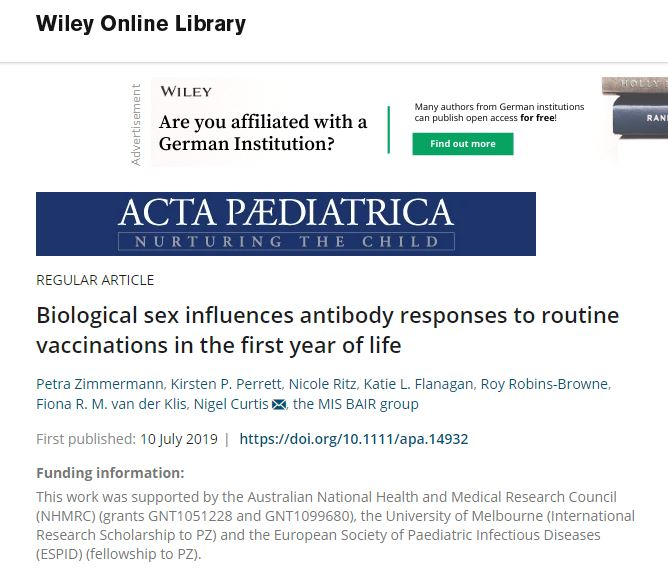Biological sex influences antibody responses to routine vaccinations in the first year of life.
We investigated the effect of early-life factors, namely sex, delivery mode, feeding method and antibiotic exposure, on antibody responses to routine vaccinations administered during the first year of life. One and seven months after the primary course of routine vaccines and 1 month after routine vaccines at 12 months of age, antibodies against 26 vaccine antigens were measured in 398 healthy infants. The geometric mean concentration (GMC) of antibodies (adjusted for effect modifiers with multiple linear regression) and the seroprotection rate for each vaccine were compared for each early-life factor. Sex had an influence on GMCs. Antibody concentrations were significantly lower at 7 months of age in females for tetanus and filamentous haemagglutinin and at 13 months of age for pertactin. In contrast, at 13 months of age, antibody concentrations were significantly higher in females for polio type 3, pneumococcal serotype 6A and measles. Sex did not have an influence on seroprotection rates. Delivery mode, feeding method and antibiotic exposure did not exert a substantial influence on vaccine antibody concentrations. There is a difference between males and females in the humoral response to routine vaccinations in the first year of life.
Authors
Petra Zimmermann; Kirsten P Perrett; Nicole Ritz; Katie L Flanagan; Roy Robins-Browne; Fiona R M van der Klis; Nigel Curtis
External link
Publication Year
Publication Journal
Associeted Project
Microbiology or Immunology
Lista de serviços
-
Gene regulatory and signaling networks exhibit distinct topological distributions of motifs.Gene regulatory and signaling networks exhibit distinct topological distributions of motifs.
-
Gene signatures of autopsy lungs from obese patients with COVID-19.Gene signatures of autopsy lungs from obese patients with COVID-19.
-
Network Medicine: Methods and ApplicationsNetwork Medicine: Methods and Applications
-
ACE2 Expression Is Increased in the Lungs of Patients With Comorbidities Associated With Severe COVID-19.ACE2 Expression Is Increased in the Lungs of Patients With Comorbidities Associated With Severe COVID-19.
-
Drug repositioning for psychiatric and neurological disorders through a network medicine approach.Drug repositioning for psychiatric and neurological disorders through a network medicine approach.
-
Linking proteomic alterations in schizophrenia hippocampus to NMDAr hypofunction in human neurons and oligodendrocytes.Linking proteomic alterations in schizophrenia hippocampus to NMDAr hypofunction in human neurons and oligodendrocytes.
-
In-depth analysis of laboratory parameters reveals the interplay between sex, age, and systemic inflammation in individuals with COVID-19.In-depth analysis of laboratory parameters reveals the interplay between sex, age, and systemic inflammation in individuals with COVID-19.
-
The evolution of knowledge on genes associated with human diseasesThe evolution of knowledge on genes associated with human diseases
-
Network vaccinology.Network vaccinology.
-
Pyruvate kinase M2 mediates IL-17 signaling in keratinocytes driving psoriatic skin inflammationPyruvate kinase M2 mediates IL-17 signaling in keratinocytes driving psoriatic skin inflammation
-
Transcriptome analysis of six tissues obtained post-mortem from sepsis patientsTranscriptome analysis of six tissues obtained post-mortem from sepsis patients
-
Gene Signatures of Symptomatic and Asymptomatic Clinical-Immunological Profiles of Human Infection by Leishmania (L.) chagasi in Amazonian BrazilGene Signatures of Symptomatic and Asymptomatic Clinical-Immunological Profiles of Human Infection by Leishmania (L.) chagasi in Amazonian Brazil
-
In vitro morphological profiling of T cells predicts clinical response to natalizumab therapy in patients with multiple sclerosis.In vitro morphological profiling of T cells predicts clinical response to natalizumab therapy in patients with multiple sclerosis.
-
Integrative immunology identified interferome signatures in uveitis and systemic disease-associated uveitis.Integrative immunology identified interferome signatures in uveitis and systemic disease-associated uveitis.
-
Gene regulatory networks analysis for the discovery of prognostic genes in gliomas.Gene regulatory networks analysis for the discovery of prognostic genes in gliomas.
-
Revealing shared molecular drivers of brain metastases from distinct primary tumors.Revealing shared molecular drivers of brain metastases from distinct primary tumors.

